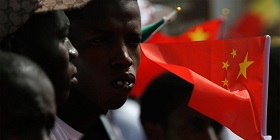Now China is interested in Egypt as a strategic partner for several main reasons. Firstly, the Suez Canal is an important transport artery of the world and a vital link in the 21st Century Maritime Silk Road. In this regard, cooperation with the ARE is becoming a crucial priority to China. Secondly, the increasing Chinese influence on Egypt contributes to the growing role of China in the Mediterranean region. With the intensification of military-political cooperation between Cairo and Beijing, this may lead to increased pressure on the EU countries. Thirdly, given its election to the chairmanship of the African Union and the strengthening of its role in the organization, Egypt becomes one of the key vehicles of Chinese interests on the African continent. Finally, Egypt remains an important market for Chinese goods.
It is worth noting that Cairo has a negative attitude toward cooperation between China and Ethiopia in the field of hydropower: Beijing gives Addis Ababa cash loans for the implementation of planned projects. Thus, China is providing invaluable services to a state with unfriendly relations with Egypt. However, the Ethiopian factor seems insignificant in the context of the strategic partnership between China and Egypt; therefore, both countries will continue to develop cooperation effectively.
On May 30, 1956, during the visit of the head of the People’s Republic of China (PRC) State Council Zhou Enlai to Egypt, the Arab Republic announced the diplomatic recognition of the Chinese сommunist government as the only legitimate one. Thus, Egypt became the first Arab and African country that established diplomatic relations with the PRC. Even though official recognition occurred only in 1956, the interaction between the two countries developed much earlier. For example, in the 1930s, twenty Chinese Muslim students were sent to Egypt for studying at Al-Azhar University, and then they became translators and teachers of Arabic in China. After the establishment of official diplomatic relations, Egypt supported the PRC in its desire to become a full member of the UN Security Council with the right of veto. In turn, China condemned the aggression of Great Britain, France, and the United States displayed against the Arab Republic of Egypt (ARE) during the Suez crisis.
Now Beijing is a crucial military-technical partner of Cairo. From 2012 to 2014, China shipped eighteen ASN-209 unmanned aerial vehicles (UAVs) to Egypt; from 2017 to 2018, ten Wing Loong-1 drones arrived at the ARE, and in 2018 an agreement was reached with the Arab Republic on the supply of Wing Loong-2 drones.
China is the largest exporter for Egypt. In 2017, exports reached $ 8.07 billion, accounting for 13% of all Egyptian imports. At the same time, the import of goods from Egypt reached $ 1.19 billion. The main items of Egyptian exports to China are crude oil (63%), marble, travertine and alabaster (8.1%), as well as citrus fruits (6.1%). The goods imported by Egypt are more diverse and adaptable: these are synthetic fibres (4.8%), telecommunications equipment (4.7%) and telephones (3.8%).
China's Interest in Egypt is not Accidental
After the beginning of the Arab Spring in Egypt in 2011 and the overthrow of President Hosni Mubarak, the ARE, which even before the revolution was a developing country, entered an even more difficult economic situation. In this regard, it was essential for Egyptian leadership to attract additional foreign investment. In August 2012, the newly elected President of the ARE, Mohammed Mursi, met with his colleague from China Hu Jintao. His visit to China was his first official trip outside the Arab world, which underlined Egypt's foreign policy priorities during that period.
The two countries signed an agreement which entailed Beijing's commitment to the provision of threehundred police cars to Egypt, as well as a loan of $ 200 million to the National Bank of Egypt. An agreement on cooperation in the fields of tourism, environment, and agriculture was signed, and the need to attract investment in Egypt was discussed. Talks between the leaders of the two states concerned political issues, among other things: the civil war in Syria, the stabilization of the situation in the Middle East, the potential use of the Suez Canal for the passage of Chinese warships to the Mediterranean and Black Seas.
The Mediterranean area is an essential track in Beijing's foreign policy. In 2015, the Premier of the PRC State Council, Li Keqiang, announced the need to revitalize China in the Baltic, Black and Adriatic Seas. Earlier, in 2013, the Silk Road Economic Belt initiative was launched, a Chinese concept aimed at improving existing trade routes and creating new transport and economic ways connecting more than 60 countries of Central Asia, Europe, and Africa. The project contributes to the development of trade relations between the PRC and other countries. As part of its One Belt, One Road Global Economic Expansion Program, China is trying to intensify trade through the Suez Canal. The sea route Belt and Road Initiative runs through not only Egypt but also other Mediterranean countries like Italy and Greece. However, here China is facing severe opposition from the EU countries, whose leaders perceive the One Belt, One Road Initiative as a threat to the European economies. Against this background, Egypt is becoming a convenient partner for China. Especially given its difficult socio-economic situation, the Arab Republic is forced to develop trade and economic relations with the PRC, and thereby voluntarily surrenders its market to Chinese entrepreneurs.
Strengthening Cooperation between Beijing and Cairo with the Coming to Power of Abdel Fattah al-Sisi
In recent years, after the "June 30 Revolution" in 2013, cooperation between the two countries is growing. The revival of relations began with the visit of the President of the ARE, Abdel Fattah al-Sisi, to China in December 2014, which opened an entirely new page in the interaction between the two states. During negotiations, President al-Sisi and Chinese President Xi Jinping touched upon issues of expanding political cooperation between China and Egypt, including parties, governmental structures, as well as non-governmental organizations. They also discussed the need to share experience in public administration, which most likely means Egypt’s appeal to Chinese practices, and not vice versa. At the end of negotiations between the heads of the PRC and the ARE, it was announced that China’s interests in creating the Silk Road Economic Belt and the 21st Century Maritime Silk Road, combined into the Belt and Road Initiative, coincide with major development projects in Egypt. In this regard, they decided to expand cooperation in the field of infrastructure construction, nuclear energy, alternative energy sources, and the aerospace industry. Besides, the heads of states agreed to provide the necessary funding for the development of cooperation in these areas.
Both countries agreed to improve cooperation in the framework of trilateral formats with Arab and African states. Moreover, China announced its readiness to strengthen and develop cooperation with Egypt in the field of military cooperation, law enforcement, and security, as well as the fight against terrorism and transnational crimes. Additionally, mutual support in international and regional affairs was announced. Following the talks, the heads of state signed a joint statement for the establishment of a comprehensive strategic partnership between China and Egypt, as well as a series of cooperation agreements in the field of trade, economy, aerospace industry and energy.
Since then, the heads of the Egyptian and Chinese states meet every year, sometimes several times a year. Abdel Fattah al-Sisi and Xi Jinping confirmed the strategic nature of the partnership between China and Egypt, they agreed on the need for further development of bilateral relations, not only in the field of trade and economic cooperation but also in military-technical and military-political cooperation. Also, the parties confirmed their mutual interest in the development of the Chinese project One Belt, One Road. Summing up the results of recent years of cooperation, the successful implementation of the New Suez Canal project with the participation of China should be mentioned, as well as the modernization of Egypt's infrastructure and the preparation for the launch of a large industrial project — an economic zone in the Suez Canal area.
Despite some positive trends, there is a serious challenge in Egyptian-Chinese relations that could negatively affect the interaction between the two countries — intensive cooperation between China and Ethiopia. In particular, Beijing provides Addis Ababa with financial and technological assistance in the construction of the Gilgel Gibe III Dam on the Omo River, as well as the Tekeze Dam. Egypt perceives Ethiopia's hydropower policies as a threat to its national security. This is primarily due to the construction of the Grand Ethiopian Renaissance Dam on the Blue Nile River. The Ethiopian leadership plans to build the Hidase hydroelectric power plant, the largest hydroelectric power station on the African continent. In case of successful completion of the project, the generation of electricity at the Aswan hydroelectric power station will be significantly reduced, but most importantly, it can do damage to the irrigation system of the ARE. Of course, this will lead to a deepening of the economic crisis in which the Arab Republic is now.
To sum up, now China is interested in Egypt as a strategic partner for several main reasons. Firstly, the Suez Canal is an important transport artery of the world and a vital link in the 21st Century Maritime Silk Road. In this regard, cooperation with the ARE is becoming a crucial priority to China. Secondly, the increasing Chinese influence on Egypt contributes to the growing role of China in the Mediterranean region. With the intensification of military-political cooperation between Cairo and Beijing, this may lead to increased pressure on the EU countries. Thirdly, given its election to the chairmanship of the African Union and the strengthening of its role in the organization, Egypt becomes one of the key vehicles of Chinese interests on the African continent. Finally, Egypt remains an important market for Chinese goods.
It is worth noting that Cairo has a negative attitude toward cooperation between China and Ethiopia in the field of hydropower: Beijing gives Addis Ababa cash loans for the implementation of planned projects. Thus, China is providing invaluable services to a state with unfriendly relations with Egypt. However, the Ethiopian factor seems insignificant in the context of the strategic partnership between China and Egypt; therefore, both countries will continue to develop cooperation effectively.
First published in the collection «International Scientific Conference "Place of the Asia-Pacific Region in Modern International Relations: Security Problems and Development Prospects". 2019. Collection of articles / Ed. V.A. Avatkov, T.V. Kashirina - M., 2019. - p.20-24».







